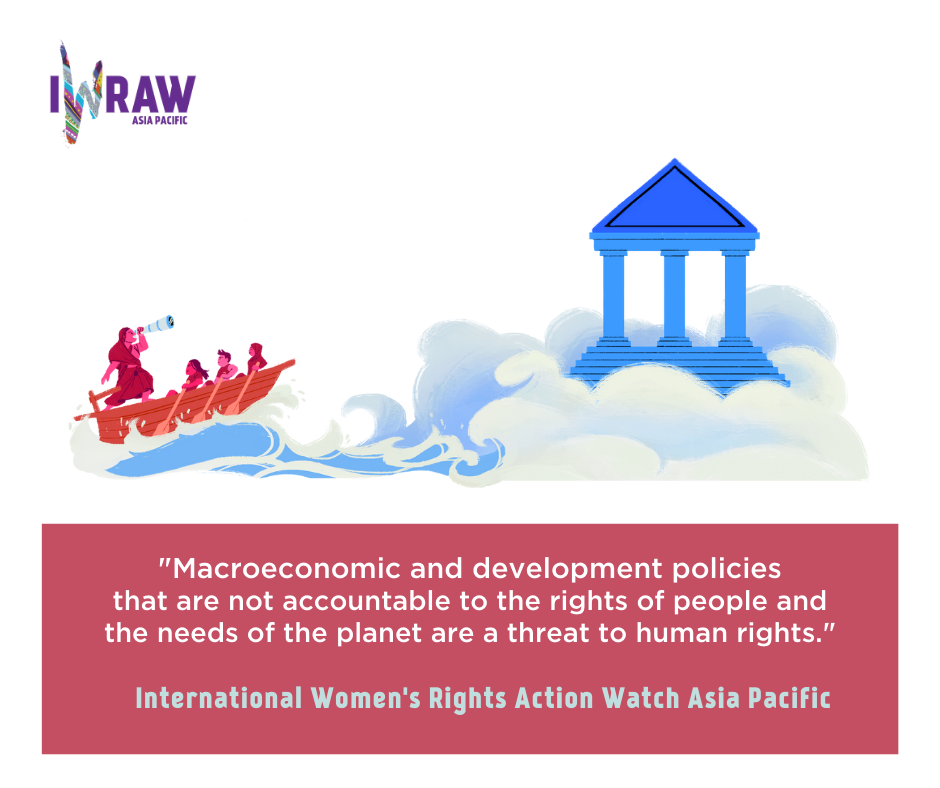 GEM Starter Kit
GEM Starter Kit  How to use this starter kit
How to use this starter kit
Why did we decide to work on macroeconomics and gender equality?
Neoliberalism1‘Neoliberalism’ can be defined as a set of principles and policies which aim to strengthen business interests. The main principles of neoliberalism include free market, privatisation, deregulation, and a shrinking welfare state. Throughout this starter kit, we will discuss these policies and the ways in which they have been implemented. For further information on neoliberalism, see Martinez, E., & Garcia, A. (1 January 1997). “What is Neoliberalism?” CorpWatch. as an economic and political ideology has long failed. Though the term has a longer history, it is often associated with economic theories and models taught at universities in the United States during the 1960s and 1970s (particularly, the University of Chicago), and spread to other countries and communities around the world through American trained economists and economic reforms backed by the United States and other imperialist powers. For example, before neoliberalism took its roots in the Western world, Latin America (particularly Chilean society) became the testing ground for neoliberal economic policies, strong-armed into place through violent dictatorships and with devastating results.2Perreault, T., & Martin, P. (2005). “Geographies of Neoliberalism in Latin America”. Environment and Planning A: Economy and Space, 37(2), 191–201.
After 40 years of neoliberal dominance and often violent implementation around the world, the resulting destruction, poverty, and extreme forms of inequalities has become the new normal in many ways. Its promise of wealth trickling down to all segments of society never came true. Eradication of inequalities and achievement of shared prosperity never happened. The increased standards of living and wellbeing promised by neoliberal economic theorists happened only for a select few, while the vast majority suffered.
In fact, these policies continue to dominate global macroeconomic approaches, advocating for reforms, such as privatisation of social services and reductions in public spending, despite their failure to address the realities for women and girls and negative impact on their rights. In many cases, these policies exacerbate the discrimination they experience: unpaid care burden, gender pay gaps, workplace and domestic violence, as well as many other structural inequalities in their lives. The reliance on private finance and partnerships, especially in the development agenda, increases the influence of the private sector. This reliance then ignores the private sector’s violations of human rights, and risks undermining gender equality.
Because of their dominance and the appearance often given by policymakers and media outlets that they are widely agreed to as the best approach to designing an economy, we sometimes refer to the bundle of policies described above and throughout this starter kit as ‘conventional’. Conventional approaches to macroeconomic policies often mean that democratic practices, the commons, and interests of people and the planet become secondary/subject to business interests.3More information on what is meant by ‘macroeconomics’ is discussed in the next section of this starter kit. Macroeconomic policies are talked about in closed rooms, decided in private meetings, guided by private sector interests, and either intentionally or structurally kept far from the reach and agenda of society, when they in fact define many of the conditions we live in. When mobilised in this way, macroeconomic policy-making erodes the accountability systems which are vital for democratic governance. Presenting one approach to economic policy making as widely accepted or agreed on also hides the deep links between today’s economic systems and colonialism, the transatlantic slave trade, white supremacy, and other intersecting systems of oppression that have long histories and ongoing impacts.
Moreover, the impact of macroeconomic policy decisions is experienced differently by different groups of women. The voices of women whose identities and communities are already criminalised, marginalised, and disenfranchised by the current global economic order will be impacted even more by policy choices that exclude or ignore them. At minimum, said policies will replicate existing power dynamics and the experiences of discrimination that are associated with those dynamics. Those facing multiple forms of discrimination will likewise be ‘multiply burdened’4Crenshaw, K. (1989). “Demarginalizing the Intersection of Race and Sex: A Black Feminist Critique of Antidiscrimination Doctrine”, Feminist Theory and Antiracist Politics. University of Chicago Legal Forum, 1989 (1, Article 8), 139–167. by policy choices that reject the transformative action required to eradicate global inequality, whether through ideology or wilful ignorance.
The key is understanding that decisions on what kinds of economic policies to support and who they benefit are all political. Other choices are available and possible. We can change and transform these agendas into policies that can benefit all women and girls throughout the world through critical analysis, fostering solidarity across communities and movements, and challenging and disrupting power imbalances within dominant global macroeconomic and development structures. Only through understanding and organising around these issues can we build collective action towards a more feminist and inclusive future: a future that will enable the full enjoyment of women’s human rights. This will be established through meaningful and effective participation of women, especially those from marginalised groups in the Global South.
This starter kit aims to demystify and challenge the macroeconomic policies that are very much within our reach. Through this kit, we are hoping to encourage more women’s rights organisations to look into macroeconomic policies and their effects, and incorporate this analysis into the work they are undertaking. Moreover, we also hope to encourage activists and researchers working on economic rights and justice to incorporate a gender analysis and feminist perspective in their work, and to increase the collaborations among these two groups.
We are indebted to the decades of analysis and advocacy of feminists, especially those from the Global South and marginalised groups. They have challenged and worked to build alternatives to the unequal and unjust consequences of neoliberal economic systems. As we continue to work on macroeconomics and development, we will continue to support and collaborate with our partners in their work, both within our movement and across movements.
 GEM Starter Kit
GEM Starter Kit  How to use this starter kit
How to use this starter kit
Footnotes
- 1‘Neoliberalism’ can be defined as a set of principles and policies which aim to strengthen business interests. The main principles of neoliberalism include free market, privatisation, deregulation, and a shrinking welfare state. Throughout this starter kit, we will discuss these policies and the ways in which they have been implemented. For further information on neoliberalism, see Martinez, E., & Garcia, A. (1 January 1997). “What is Neoliberalism?” CorpWatch.
- 2Perreault, T., & Martin, P. (2005). “Geographies of Neoliberalism in Latin America”. Environment and Planning A: Economy and Space, 37(2), 191–201.
- 3More information on what is meant by ‘macroeconomics’ is discussed in the next section of this starter kit.
- 4Crenshaw, K. (1989). “Demarginalizing the Intersection of Race and Sex: A Black Feminist Critique of Antidiscrimination Doctrine”, Feminist Theory and Antiracist Politics. University of Chicago Legal Forum, 1989 (1, Article 8), 139–167.


